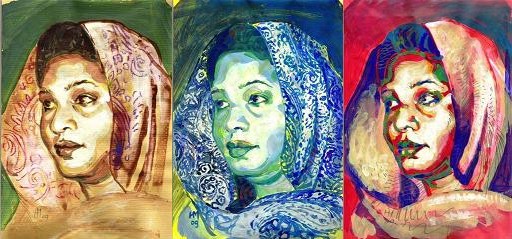New Details in Lubna Ahmed Hussein's France24 Interview; Acquittals for Women Resisting Flogging in Tuti
/Lubna Ahmed Al-Hussein, Sudanese Journalist
France24 has translated an interview with Lubna Ahmed Hussein, after she was prevented from leaving Khartoum last Monday evening, Aug. 10th on a flight from Khartoum to Beirut.
A significant new incident with a positive ending from my point of view, occurred in Sudan this week, on the island of Tuti. Details are in last paragraph of our recap, so that we follow Lubna’s story line in the video.
Lubna’s Travel Ban
During the 12 minute interview Lubna expands her arguments of the illegality of her proceedings, saying:
• She is under no legal travel ban; the document shown to her at the irport was signed by her accusing officer, not her Sudanese judge of the minister of interior.
• Lubna argues that a Sudanese travel ban can be imposed for only two reasons: a serious crime or a financial crime.
“Apparently, in Sudan wearing trousers is a serious crime,” Lubna says.
 Note, this link will also take you to the petition site for Lubna’s desire to repeal Article 152Link to petition
Note, this link will also take you to the petition site for Lubna’s desire to repeal Article 152Link to petition
The Night of Her Arrest
• Adds new details of the ‘catwalk’ the women were put through at the police station, to determine who would be formally charged under Article 152.
• After the ‘catwalk’, six women were released; 10 flogged after appearing before the Public Order Court; and three women, including Lubna, demanded a formal hearing.
• Lubna argues that the Public Order Courts are unconstitutional.
Flogging, Clothing, Islam, Public Decency
• Sudanese courts admit that 43,000 women were arrested in 2008, under Article 152, for improper dressing.
• Islam doesn’t acknowledge flogging for improper clothing. (In our translation of Lubna’s earlier interview, Lubna waves a copy of article 152, which has no stipulations of how to determine offensive clothing. There is no mention of trousers being prohibited in Article 152.)
• Sudan is a multi-ethnic, multi-cultural country, and you cannot legislate these matters of clothing.
• Prior to 1991, there was no criminal code saying what women should wear. Clothing is a social phenomenon, not a legal one. Society should be the judge of what is appropriate.
History of Women in Sudan
• Since the sixties, women in Sudan have enjoyed greater freedoms than in other Arab countries.
• Sudan was the first country in the region to give women the vote. In the seventies, Sudan had a woman minister.
• In today’s Sudan, women continue to play a central role in society. (Note from Anne: I’ve been reading materials about this topic, in an attempt to understgand how much liberty Sudanese women have lost in the last 30 years. It seems the women in Khartoum — certainly not Darfur — haven’t specifically lost their rights. Rather, there is this increasingly hostile ‘hovering’ around women in Sudan. You never know when you will be arrested for being in violation of the totally unspecific Article 152. The warfare is psychological, until you are arrested, hauled into court, and flogged — like the 43,000 women subjected to this punishment in 2008)
• The social reality of Sudan is not in sync with the restrictive, arbitrary nature of Article 152.
Lubna the Journalist (I’ve inverted this information with the final news nugget)
• She has refused to work for two years, due to censorship of newspapers.
• Presently, a representative of the security authority comes into the offices of the newspapers in Sudan, reads the article and underlines what must be removed or censored. So Lubna refuses to work as a local journalist.
NEW NEWS: “My case has stricken a blow to the wall of humiliation” (of women being flogged), says Lubna.
Lubna relates the fact that 10 women were arrested by the Public Order Police on the Sudanese island of Tuti this week, for immoral dressing. (Presently in Google news or blogs, we have no English information on this incident.)
Rather than plead guilty and be flogged, the women went home, informed family members, friends and colleagues, inviting them to attend their hearings.
“My case is striking a blow to the wall of humiliation,” Lubna says. “The women were all acquitted.”
Sudanese society, according to Lubna, is realizing that the problem is the law, and not women’s behavior.
End of interview. Anne























































